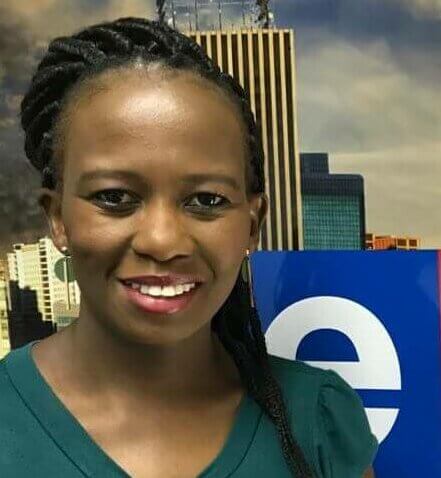Name: Hloni Mtimkulu
Age: 30-ish…
Nationality: South African
Current job: Sports Reporter at eNCA
Education: Bachelor of Science degree
About Hloni
eNCA Sports Reporter Hloni Mtimkulu believes that journalism chose her as she got into the field by accident after initially pursuing a degree in science. She cut her teeth in sports journalism on commercial radio station KayaFM and has used her platform over the years to highlight women’s sports.
The daughter of the 2017 Vodacom Journalist of the Year (VJOY) Lifetime Achievement award winner Dr Phil Mtimkulu, she was recently recognised as the best sports journalist in the country at the 2022 Vodacom Journalist of the Year Awards, and commended for, “making it her daily quest to consistently bring the coverage of particularly women in sport into mainstream media”.
When she’s not on our screens highlighting the developments taking place in women’s sport, she doubles as the secretary general of the South African Football Journalists Association, which represents the interests of football journalists in South Africa.
We briefly caught up with Mtimkulu to discuss all things women’s sports:
Q: Do you think women’s sports receive enough media attention in South Africa?
A: Not at all. The disparity is glaring. There are many historic factors for this, but it doesn’t make it any less jarring to note the difference. It’s not even just women’s sport that doesn’t receive enough coverage, by the way. Our defaults are skewed to the way things were done before, but we can all be part of creating a new narrative.
Q: What are some of the challenges you face when covering women’s sports stories locally?
A: Women doing sport remains “not the default”. So, there’s a lot of overcoming and changing of mindsets that has to happen in terms of how we, as a public/in general, take interest in/perceive women doing sport.
Q: What are some of the highlights that you can think of in your long-standing coverage of women’s sports?
A: Honestly, there are way too many… The scenes at OR Tambo on July 26, 2022 [After Banyana Banyana had won Wafcon], covering some of the Bok Women’s [the South African national women’s rugby team] preparations for last year’s Rugby World Cup – the team won five of six Tests in 2022 (before the World Cup), [and] that had never happened before!
I just remember how happy those players were, and you have to imagine what kind of situation they’re coming from (as non-professionals) to understand the gravity of the whole thing. But generally, I cover a very wide variety of codes and do a lot of mainstream stuff, so it’s always a bonus when I’m able to do a feature on a team or an athlete.
Q: What are some of your aspirations for the future of South African women’s sports?
A: That everyone who is involved would be intentional, in their little corner, about changing things. We do a lot of talking about women’s sport, but things change when we [have to] commit to doing something about a thing (and doing the thing).
Q: You recently won a national VJOY award in the sports category. What does that achievement mean to you?
My dad was awarded the VJOY Lifetime Achiever Award in 2017 for his contribution to journalism in the 1970s and 1980s, so it’s great to have that in common with him (seeing how he was part-responsible for getting me into reading all those newspapers all those years ago).
I didn’t think it would mean that much, but being at both the regional and national awards made me see how much of a big deal the whole thing was: an actual journalism award! Those weeks were such a necessary reminder for me about journalism. I’m a sports person, but I was hearing about all these amazing, interesting, fun, and challenging things that make up other parts (the real parts) of the industry, in the company of some of the country’s best newshounds!
You can follow Hloni Mtimkulu on Twitter!
